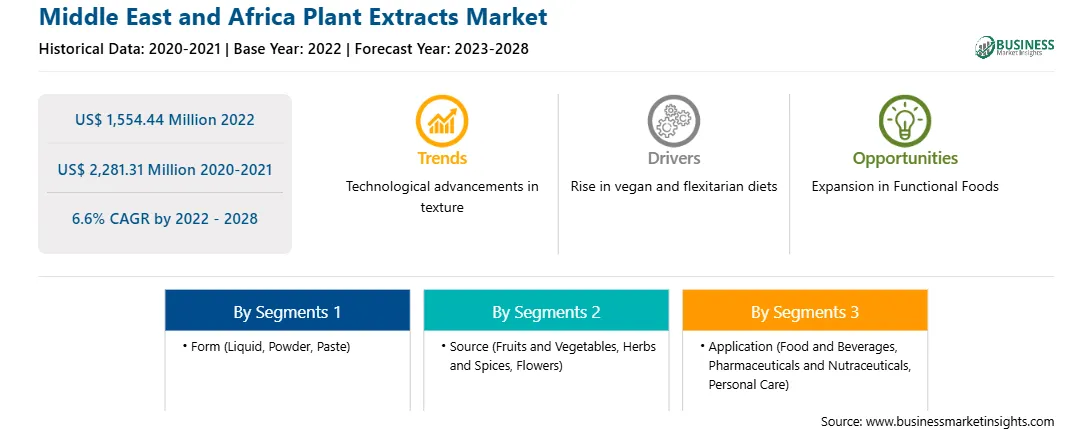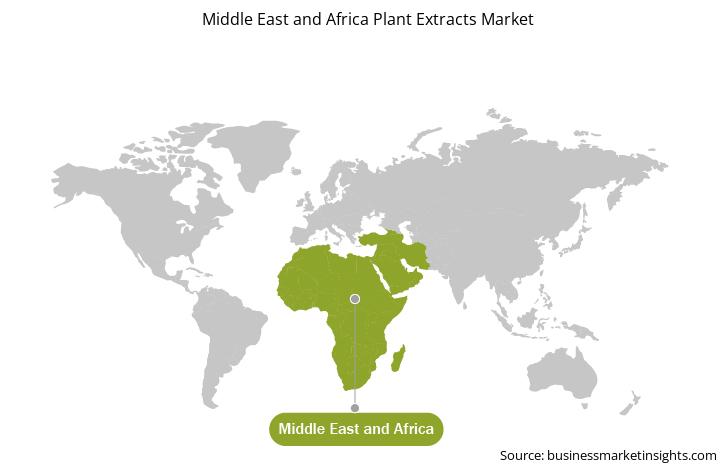The plant extracts market in the Middle East & Africa is expected to grow from US$ 1,554.44 million in 2022 to US$ 2,281.31 million by 2028; it is estimated to grow at a CAGR of 6.6% from 2022 to 2028.
Consumers are highly concerned about their diet. They have been paying attention to ingredients used in processed food products. Herbal and natural products are becoming increasingly popular, owing to their perceived health benefits. Moreover, consumers increasingly prefer food and beverage products that are free of synthetic flavors, colors, and other ingredients. They are willing to pay high prices for these ingredients. There is an increasing consumer awareness related to the adverse health effects of consuming synthetic ingredients. Therefore, the demand for natural ingredients is rising in the food & beverage industry. In addition, the use of various artificial flavorings in food and beverages is prohibited by several health organizations and food safety associations. Plant extracts are widely used as an antioxidant, antimicrobial agents, and shelf life-extending agents in the industry. Furthermore, the extracts are significantly used as flavoring agents in many food products. Moreover, changing people's preferences toward a healthy lifestyle, rising awareness related to the side effects of synthetic flavors, and growing R&D activities for natural extracts as ingredients are boosting the demand for plant extracts in the food & beverages industries. Thus, manufacturers are adopting strategic development initiatives to cater to the rising demand for plant extracts, which drives the market growth.
Strategic insights for the Middle East and Africa Plant Extracts provides data-driven analysis of the industry landscape, including current trends, key players, and regional nuances. These insights offer actionable recommendations, enabling readers to differentiate themselves from competitors by identifying untapped segments or developing unique value propositions. Leveraging data analytics, these insights help industry players anticipate the market shifts, whether investors, manufacturers, or other stakeholders. A future-oriented perspective is essential, helping stakeholders anticipate market shifts and position themselves for long-term success in this dynamic region. Ultimately, effective strategic insights empower readers to make informed decisions that drive profitability and achieve their business objectives within the market. The geographic scope of the Middle East and Africa Plant Extracts refers to the specific areas in which a business operates and competes. Understanding local distinctions, such as diverse consumer preferences (e.g., demand for specific plug types or battery backup durations), varying economic conditions, and regulatory environments, is crucial for tailoring strategies to specific markets. Businesses can expand their reach by identifying underserved areas or adapting their offerings to meet local demands. A clear market focus allows for more effective resource allocation, targeted marketing campaigns, and better positioning against local competitors, ultimately driving growth in those targeted areas.Middle East and Africa Plant Extracts Strategic Insights

Middle East and Africa Plant Extracts Report Scope
Report Attribute
Details
Market size in 2022
US$ 1,554.44 Million
Market Size by 2028
US$ 2,281.31 Million
Global CAGR (2022 - 2028)
6.6%
Historical Data
2020-2021
Forecast period
2023-2028
Segments Covered
By Form
By Source
By Application
Regions and Countries Covered
Middle East and Africa
Market leaders and key company profiles
Middle East and Africa Plant Extracts Regional Insights

Middle East & Africa Plant Extracts Market Segmentation
The Middle East & Africa plant extracts market is segmented on the basis of form, source, application, and country. Based on form, the market is segmented into liquid, powder, and paste. The liquid segment dominated the market in 2022. Based on source, the market is segmented into fruits and vegetables, herbs and spices, flowers, and others. The herbs and spices segment dominated the market in 2022. Based on application, the Middle East & Africa plant extracts market is segmented into food and beverages, pharmaceuticals and nutraceuticals, personal care, and others. The food and beverages segment dominated the market in 2022. Based on country, the Middle East & Africa plant extracts market is segmented into the South Africa, Saudi Arabia, the UAE, and the rest of Middle East & Africa. Further, the rest of Middle East & Africa dominated the market in 2022.
A few of the key players dominating the Middle East & Africa plant extracts market are Dohler; Givaudan S.A.; Indesso; Ingredion Inc.; International Flavors & Fragrances, Inc.; Kemin Industries, Inc.; Kerry Group Plc; Sensient Technologies Corporation; and Symrise.
The Middle East and Africa Plant Extracts Market is valued at US$ 1,554.44 Million in 2022, it is projected to reach US$ 2,281.31 Million by 2028.
As per our report Middle East and Africa Plant Extracts Market, the market size is valued at US$ 1,554.44 Million in 2022, projecting it to reach US$ 2,281.31 Million by 2028. This translates to a CAGR of approximately 6.6% during the forecast period.
The Middle East and Africa Plant Extracts Market report typically cover these key segments-
The historic period, base year, and forecast period can vary slightly depending on the specific market research report. However, for the Middle East and Africa Plant Extracts Market report:
The Middle East and Africa Plant Extracts Market is populated by several key players, each contributing to its growth and innovation. Some of the major players include:
The Middle East and Africa Plant Extracts Market report is valuable for diverse stakeholders, including:
Essentially, anyone involved in or considering involvement in the Middle East and Africa Plant Extracts Market value chain can benefit from the information contained in a comprehensive market report.